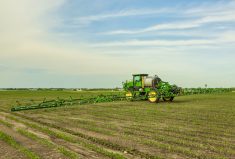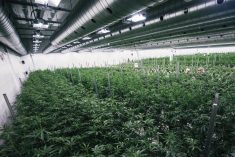Glacier FarmMedia—Leaders in Canada’s hemp industry were hoping an expert committee would recommend significant changes to hemp regulations so it could be treated the same as wheat, canola and other crops.
That didn’t happen.
Instead, the committee of experts reviewing the Cannabis Act barely mentioned hemp in its 91 page report published March 21.
The Canadian Hemp Trade Alliance said the report fails to provide “meaningful guidance” on how Canada should manage and oversee hemp production and processing in the future.
Read Also

Wheat breeding system no longer works, Canadian Wheat Research Coalition report says
A Canadian Wheat Research Coalition report, published Feb. 26, says the status quo is not an option for Canada’s wheat breeding system. It must be transformed, by farmers.
“The expert committee … were focused virtually 100 per cent on public health and safety, protection of youth. And they had no expertise and no mandate to consider hemp,” said Ted Haney, president and chief executive officer of the CHTA.
“But they pretty much just kicked the ball down the court.”
CHTA chair Clarence Shwaluk made a similar comment.
He said the committee could have recommended changes to the Cannabis Act that would separate hemp from “drug regulations and removed obstacles to our industry’s growth and development.”
Health Canada has regulated the cultivation of hemp since hemp was first grown in Canada in the late 1990s, requiring farmers to get a license to grow the crop.
Initially, farmers accepted those constraints. But over the last 10 to 15 years, growers and hemp advocates have lobbied the federal government to de-regulate the crop and free it from Health Canada regulations.
In 2018, the federal government legalized the production and recreational use of cannabis. Folks in the hemp industry assumed that legalization of cannabis would help liberate hemp from the Health Canada regulations.
However, the federal focus on cannabis has created more problems, Haney said.
“Being regulated under Health Canada became more difficult after the legalization of cannabis,” he said.
“The focus of the structures … became all cannabis, all the time.”
One major obstacle for hemp is that some bureaucrats and policy makers in Ottawa did understand hemp and the opportunity for Canada’s agriculture and agri-food industry.
However, in the last five years or so, many of those bureaucrats retired or moved on to other opportunities, Haney said.
“We ended up with new officials … (with) very little expertise (and) very little knowledge of agriculture,” he said. “The mandates of Health Canada aren’t related to agronomy … variety approval, licensing, food safety.”
Hemp has been grown in Canada for about 25 years, but the industry has never lived up to its promise. In the 2010s, hemp leaders were predicting that acreage would hit 250,000 by 2018. That target was never reached as the industry went through several boom and bust cycles.
In the last few years, farmers have seeded 35,000 to 50,000 acres of hemp across Canada for the food industry or for fibre.
The expert committee report and the lack of recommendations to de-regulate hemp are a disappointment for Canada’s hemp sector, but Haney believes opportunities remain.
The report and the minimal mention of hemp in 91 pages illustrates that hemp has nothing to do with cannabis.
“They (Health Canada) convened a legislative review, the expert panel has been clear that hemp really isn’t related to their mandate. It doesn’t represent the kind of risks that Health Canada is adept at dealing with” Haney said.
The panel did make one recommendation regarding hemp, saying Health Canada and Agriculture Canada should create an expert advisory body to look at hemp regulations.
For Shwaluk, it’s obvious how that regulatory framework should be structured.
“The government of Canada must fully recognize that hemp is not adult use cannabis or medical cannabis and start treating hemp as a normal agricultural crop.”
—Robert Arnason writes for the Western Producer.
















